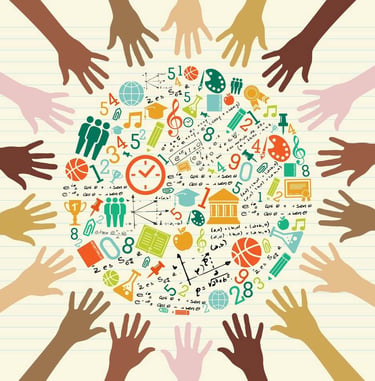The Imperative of Globalized Education in a Connected World
In a world where borders are increasingly blurred and cultures intermingle, education must adapt to prepare students for global citizenship. This blog explores the concept of globalized education, delving into its various aspects such as multiculturalism, internationalization, global competence, language learning, technology, and global citizenship education. Through insightful articles and thought-provoking discussions, we aim to shed light on the importance of embracing diversity, understanding global issues, and fostering cross-cultural communication. Join us on a journey to discover how globalized education can shape a more interconnected and inclusive world.
Team Karmanya
2/28/20242 min read


In an era marked by unprecedented interconnectedness and cultural exchange, the role of education has evolved to encompass a global perspective. Globalized education transcends geographical boundaries, embracing cultural diversity, and fostering a deep understanding of the interconnected nature of our world. This approach equips students with the skills, knowledge, and attitudes necessary to navigate the complexities of a globalized society.
Central to globalized education is the principle of multiculturalism. By acknowledging and celebrating cultural diversity, students develop a profound respect for different cultures, traditions, and perspectives. This inclusive approach not only enriches the educational experience but also cultivates empathy and promotes social cohesion in an increasingly diverse world.
Internationalization is another cornerstone of globalized education. By integrating international perspectives, examples, and case studies into the curriculum, students gain a comprehensive understanding of global issues. This exposure to diverse viewpoints fosters a more nuanced understanding of global challenges, preparing students to become informed global citizens capable of addressing complex global issues.
Global competence is a key objective of globalized education. It encompasses the ability to understand and engage with global issues, think critically, and communicate effectively across cultures. By developing global competence, students acquire the skills necessary to navigate a globalized world with confidence and sensitivity.
Language learning is a fundamental component of globalized education. By learning multiple languages, students not only gain practical communication skills but also develop a deeper appreciation for different cultures and ways of thinking. Language learning promotes cross-cultural understanding and facilitates meaningful communication in diverse cultural settings.
Technology plays a pivotal role in facilitating globalized education. Through digital platforms and tools, students can connect with peers, experts, and resources from around the world. This technological connectivity enables collaborative learning experiences and exposes students to a wide range of perspectives and ideas.
Global citizenship education is an integral part of globalized education. It seeks to instill in students a sense of responsibility towards global challenges and empowers them to take action to address these issues. By fostering a sense of global citizenship, education can inspire students to become active agents of positive change in their communities and beyond.
Globalized education is essential for preparing students to thrive in a globalized world. By embracing multiculturalism, internationalization, global competence, language learning, technology, and global citizenship education, education systems can equip students with the skills, knowledge, and attitudes necessary to become compassionate, informed, and engaged global citizens.
Empowering Education, Transforming Lives
info@karmanyagurutvam.com